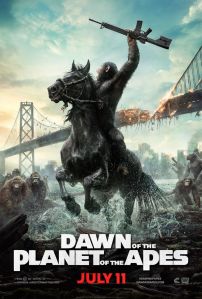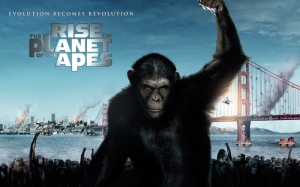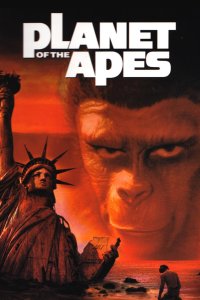Friedrich Nietzsche’s alter ego, Zarathustra, answers: “A laughing-stock, a thing of shame.”
Chernin Entertainment and 20th Century Fox answer: “About $170 million.” That’s the budget for Dawn of the Planet of the Apes, almost double the price tag of its predecessor, Rise of the Planet of the Apes, which grossed $176M in 2011.
Or I should say its most immediate predecessor. The original Planet of the Apes was released in 1968 (with a quaint budget under $6M and gross of $26M). It was based on Pierre Boulle’s 1963 French novel La Planète des singes, but that’s not where the evolutionary ladder begins either.
Rise ends with mad scientist James Franco’s creation, a genetically altered super-ape, escaping to the wilds of the Redwood forest to father his own race. That’s how Victor Frankenstein’s creature wanted to end his origin story too. Either way, the creature is humanity’s first “arch-enemy,” the term he uses when Victor refuses to manufacture him a mate. The no-longer-mad doctor fears “a race of devils would be propagated upon the earth, who might make the very existence of the species of man a condition precarious and full of terror.”
Mary Shelley’s evolved imagination was pure fantasy in 1817, but Darwin made the terror real for Victorians. H. G. Wells named humanity’s predator the “Coming Beast,” describing “some now humble creature” that “Nature is, in unsuspected obscurity, equipping . . . with wider possibilities of appetite, endurance, or destruction, to rise in the fullness of time and sweep homo away.”
That fullness of time arrives regularly in Hollywood. If not apes, then zombies, aliens or androids are always propagating and making humanity’s condition precarious and terror filled. Some scientists take that last threat, the robopocalypse, seriously.
Cambridge’s Centre for the Study of Existential Risk worries about the evolutionary threat of artificial intelligence: “we risk yielding control over the planet to intelligences that are simply indifferent to us . . . just ask gorillas how it feels to compete for resources with the most intelligent species—the reason they are going extinct is not (on the whole) because humans are actively hostile towards them, but because we control the environment in ways that are detrimental to their continuing survival.”
That’s also the plot of Dawn of the Planet of the Apes. The super-virus that decimated the human population between films is one of those unintended consequences popular in mad scientist plots. Mira Sorvino accidentally breeds an army of six-foot cockroaches after ending a cockroach-spread epidemic in Mimic. Emma Thompson cures cancer in I Am Legend, and next thing vampires rule Manhattan. James Franco’s genetic tampering would have turned everyone into super-geniuses. Or at least everyone who could afford his corporation’s new designer drug. If they’d had a chance to market it, the sequel would have been called Rise of the Planet of the Ubermensch.
No new breed ever cares about its predecessor. “And just the same shall man be to the Superman,” continues Zarathustra, “a laughing-stock, a thing of shame.” And yet Superman and his species of superheroes were born to battle such Coming Beasts. The Fantastic Four kept a subterranean world of monsters from rising up in their first issue. Atlanteans would have swept humanity away if the Human Torch hadn’t doused Namor’s Golden Age attacks. Blade is still staunching the destructive appetites of our vampire competitors. Every comic book is a survival of the fittest, ending with a superman at the top of the food chain.
But screenwriters Mark Bomback, Rick Jaffa and Amanda Silver include no super-saviors in Dawn. The hero type is usually a literal or metaphorical cross-breed who absorbs the threat of the racial other and reverses it to save humanity. Thus cyborg Arnold Schwarzenegger thwarts Skynet, and the Man of Steel thwarts General Zod’s Kryptonian invasion. Dawn would need an ape-man like Tarzan, but instead it’s the super-ape Caesar who was raised by humans and saves his people from us.
Which is a pretty compelling reversal of the formula. The supervillain is Koba, an ape so scared (literally and metaphorically) by humans that his hatred turns him into one. By the end, Caesar says he’s no longer an ape. He’s been completely absorbed by human hatred.
But there’s one flaw in the film’s evolutionary theory. It could have been titled Dawn of the Planet of the Patriarchy. I understand that actual ape culture is male-dominated, but these are scifi apes. They can talk and drive tanks. Surely there’s room for females somewhere in the hierarchy. The lone female ape character, Caesar’s jewelry-wearing wife, lies around giving birth and needing antibiotics. But would every female uber-ape accept the role of stay-at-home mom while the males go off to war?
The human cast is worse. Keri Russell, the lone female Home sapiens character, spends the movie saying things like, “I should come along in case someone gets hurt and needs a nurse!” She also prepares and serves food for her male campers. I was a part-time stay-at-home dad for years and still do a share of cooking and Band-Aid applying for my campers. But if faced with an ape-ocalypse, my wife and I would divvy up the guns too.
No intelligent species can ignore the skill sets of half its population. Not if the species wants to survive. And the humans in Dawn won’t. If you missed the first movie, there was a brief mention of a space mission to Mars. Those astronauts are scheduled to return (minus Charlton Heston) in July 2016, and I think we all know what Darwin is plotting for them.



So Chris, let me get this straight: You’re complaining because the apes in “Rise” weren’t politically correct enough?
In some ways, they actually were. In “Rise,” the apes balked at killing other apes. In the wild, there is no such “code” among like apes. Chimpanzees can be very aggressive, and they kill when it suits them, either for territory, food, or mates. In addition, in an act that is sort of a “look what I can do” move, they sometimes they kill lesser apes to scare/intimidate other chimps.
And while male chimps dominate social groups, female apes dominate each other in a sub-social group.
And since humans are about 94-99 percent genetically the same as chimps (depending on which scientist you agree with), is it really any surprise that patriarchy reared its head in this newest “apes” franchise film?
I mean, we’re trying to temper in a few generations genetic code that evolved over millions of years. Frankly, in the US at least, we’re doing a surprisingly decent job of it, methinks. There’s a ways to go, of course, but if one compares today with 150 years ago, progress has actually been pretty damn good.
But these are scifi apes. The writers could have them do anything, so the ways they do and don’t reflect actual apes is kind of irrelevant.
But I agree, when you take the long view (150 years) U.S. culture looks pretty progressive.
Which is why I was sincerely startled by the film’s portrayal of women. Compare it to any other recent apocalypse narrative. Even the original Walking Dead comics (an over-the-top libertarian reboot of 1950s gender norms) had at least one woman who could shoot a gun well. The current TV shows Defiance and Falling Skies have a female mayor and a female military commander.
The issue isn’t political correctness. It’s realism. Do you think Hilary Clinton would assign herself Band-Aid duty if aliens invaded? Talking apes are a lot easier to believe in than a 21st century America where all women quietly and happily serve their all-male leaders.
Chris — In a post-apocalyptic world, I suspect political correctness would be one of the first casualties. And yes, Hilary Clinton, if she managed to survive at all, would not be leading much of anything — not because she’s a woman, but because she’d bring nothing to the table. She’s old, physically weak, probably has no self-defense skills, probably no survival skills, and probably no science and engineering skills.
In fact, if resources were tight, other alpha females, or alpha males, would probably either dump her, or tell her to shut the hell up and do what they tell her.
No one in a post-apocalyptic environment would need a Hilary, a Boehner, a Reid, or a Rob Ford. Leaders like those are only possible in a structured, civilized society — something that would quickly vanish after a major natural cataclysm or pandemic.
But you understood my point precisely: alpha males and alpha females would take charge. That’s not about political correctness.
Welllllll, I don’t agree really, since in chimp society, the males run the show. Then again, one could argue that in this fictitious future, the genes of the smarter apes have changed, allowing them to create a politically correct, gender pluralistic society.
It’s not chimps, though, right? It’s sci-fi chimps with big brains like ours. Once you’ve got self-reflexive ape societies, arguing from biology starts to get extremely dicey, it seems like.
“Welllllll, I don’t agree really, since in chimp society, the males run the show.”
Don’t these stories tend to be metaphors for human society? Talking apes ain’t real, humans are.
Humans are talking apes.